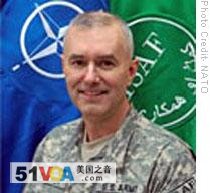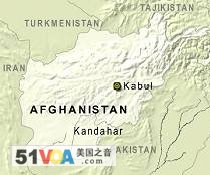Pentagon
22 April 2009
 |
| Major General Michael Tucker, chief of operations for U.S., NATO forces in Afghanistan |
Speaking via satellite, the chief of operations for U.S. and NATO forces in Afghanistan, Major General Michael Tucker, told reporters at the Pentagon 80 per cent of insurgent attacks are now happening in what the military calls Regional Command South.
"In RC [Regional Command] South we're at a stalemate. We just simply do not have enough forces to address the needs of the people down there, to set the conditions for governance to take hold. And so, the enemy obviously is taking advantage of that posture that we're certainly going to be addressing here very shortly," he said.
 |
He said there will also be an increased effort to control the Afghanistan-Pakistan border, using 51 new units of Afghan border police that are now being formed.
In contrast, General Tucker said progress made last year in eastern Afghanistan seems to be holding.
"We're approaching what you could actually cautiously term irreversible momentum in the East," he said.
He said that was achieved through a combination of military and civilian action, an approach he said will be replicated in the south as the additional U.S. troops arrive. He also said he expects a significant increase in the U.S. civilian presence this year to help with economic development projects and the building of government capacity at the local and national levels.
General Tucker also praised efforts by Pakistan's military to close insurgent safe havens on its side of the border. But he said more must be done.
"They are having an effect against the insurgency in northwest provinces. We think they could do better. We think they could probably do less focus on the Indian border and more focus on the border with Afghanistan to help stem the sanctuary that the insurgency enjoys there," he said.
General Tucker declined to say how long he thinks it will take to stabilize Afghanistan and hand over control to its government and security forces. But he said the military command has set what he called "some three-to-five-year objectives" for eliminating insurgent safe havens, fully establishing the Afghan government's authority and enabling its security forces to take control of their country.